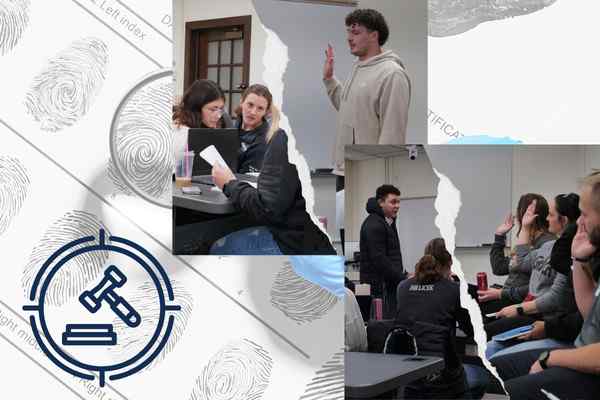Dickinson State University’s (DSU) Criminal Justice 330 course, Courts and Procedures, taught by professor Michael Jennings, recently conducted a compelling mock trial of the infamous 1981 Dickinson double homicide, widely known as the Swanson Motel Murders. This real-life case, which was never tried in court due to the unexpected death of the primary suspect in custody, provided students with a challenging and realistic legal scenario to reenact.
For the mock trial, students assumed roles such as prosecution, defense, and key witnesses. They were given access to a partial case file containing evidence and witness statements. The prosecution’s objective was to serve as a voice for the victims and secure a conviction, while the defense aimed to achieve a not-guilty verdict or a mistrial. Students who were not acting as legal counsel portrayed witnesses, mastering the case materials to deliver convincing testimony.
To ensure impartiality, the jury was composed of DSU staff and faculty members who were unfamiliar with the historical case. The mock trial was presided over by Amanda Engelstad, Stark County State’s Attorney, who acted as judge. Using her extensive courtroom experience, Engelstad guided the students, ruled on objections, and offered constructive feedback throughout the trial. “Jennings reached out to me about coming and speaking to a class,” Englestad noted. “When they decided on a mock trial and asked if I would serve as a role of judge, I was happy to do it”
Students spent five to six weeks preparing their cases, meticulously analyzing the evidence, crafting arguments, and developing strategies. The mock trial spanned two class periods, during which students called witnesses, cross-examined testimonies, and presented evidence to sway the jury. Ultimately, after deliberating, the jury was split, leading Judge Engelstad to declare a mistrial.
Hands-On Learning at Its Best
Professor Michael Jennings emphasized the educational value of the exercise. “The purpose of doing the trial is so students can apply the law and the course material that has already been discussed,” Jennings stated. “They also have the opportunity to see how an actual trial works and be able to apply the material they have already learned in the course.”
Students echoed his sentiments, highlighting the rewarding challenges they faced. Isaac Willis, a junior criminal justice major and head of the defense team, remarked, “It’s been an amazing experience—challenging but incredibly rewarding. We spent hours preparing for this case, and on behalf of the defense team, we want to thank Professor Jennings for providing this invaluable opportunity. It will definitely benefit us in our future careers.”
The prosecution team also shared their thoughts: “This was a great hands-on experience and a fantastic way to build team dynamics. It was invaluable to have a jury and receive insights from an experienced attorney like Amanda Engelstad. We deeply appreciate her role as judge and Professor Jennings for organizing this.”
DSU Vice President Joins the Jury
Among the jurors was DSU Vice President Holly Gruhlke, who praised the students for their dedication and professionalism. “Watching our students bring this case to life was such a fun and rewarding experience,” Gruhlke said. “Their preparation and poise were evident throughout the trial. This type of immersive learning exemplifies DSU’s commitment to preparing students for real-world challenges. It was an honor to participate as a juror and witness their growth firsthand.”
The mock trial not only offered students practical experience in courtroom procedures but also underscored the importance of teamwork, critical analysis, and effective communication. Professor Jennings and his students showcased how DSU’s innovative approach to education equips students with skills that extend far beyond the classroom.

